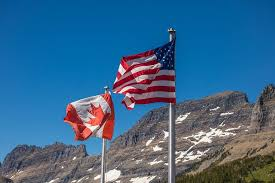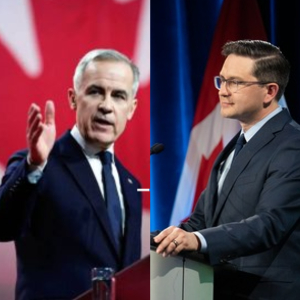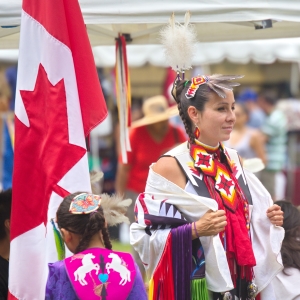
Key findings:
- Indigenous peoples and groups have experienced a significant increase in their reputation since our tracking began in 2007
- Canadians, however, find themselves torn between empowering Indigenous peoples with special rights and responsibilities and treating all individuals equally
- Indigenous issues continue to face challenges in gaining attention, given the competition with other pressing concerns like affordability and health
- Canadians express ongoing dissatisfaction with the government’s performance on Indigenous issues
Yesterday, on June 21st, 2023, Canada celebrated National Indigenous Peoples Day, honoring the history, heritage, resilience, and diversity of First Nations, Inuit, and Métis peoples. Today, INNOVATIVE is releasing additional findings from our May survey, which collected opinions and attitudes towards Indigenous issues from 2,682 Canadians. A detailed methodology is provided in the report.
Indigenous peoples’ general standing in Canada steady after multiple years of improvement
Following a shift in public perception between 2009 and 2014, INNOVATIVE has observed a consistent increase in approval ratings for Indigenous groups and organizations, who have successfully established a positive impression among Canadians. This year, nearly half (46%) of the respondents hold a favorable view of Indigenous groups and organizations, which has remained steady since last year.
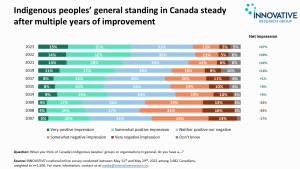
While underlying attitudes are more favourable towards Indigenous peoples, Indigenous issues are not top-of-mind
Only a quarter of Canadians have read, seen or heard anything about Indigenous peoples recently, and only 7% rank Indigenous issues among their top concerns. When considering the most important issues facing the federal government concerning Canada’s Indigenous peoples, equality and fair treatment, overcoming historical injustices and reconciliation, and balancing Indigenous rights with national interests emerge as the key areas of focus.
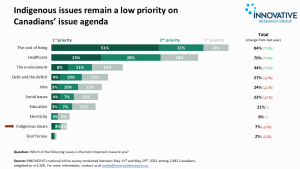
A majority of respondents express disapproval of the job performed by both the federal and provincial governments in managing Canada’s Indigenous issues. 54% of the respondents believe that the federal government should be doing more to address the problems facing Canada’s Indigenous people.
The next time Indigenous issues peak on the agenda, the governments may find themselves in a precarious position.
Canadians conflicted between providing equal treatment and allowing special rights to Indigenous people
7-in-10 Canadians agree that Indigenous peoples should have the same rights as any other Canadian, no more and no less. When asked whether Indigenous peoples should have special rights and status to protect their culture and heritage, about half of the respondents agree.
While Canadians remain conflicted between advocating for equal rights for all and recognizing special Indigenous rights, we see a remarkable shift in public opinion from over a decade ago, when Canadians were more likely to oppose the idea of granting special rights to Indigenous peoples. This change in attitude may be attributed to recent events, such as the discovery of unmarked graves at the Kamloops Indian Residential School, leading to a public opinion shift from negative to positive net agreement.
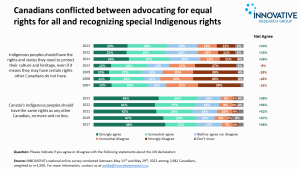
Canadians feel a moral obligation towards Indigenous peoples, but it has declined since 2021
In our earlier report, we showed that Canadians’ awareness of and frustration over the history of residential schools have not diminished since the Kamloops discovery.
Their sense of moral obligation towards Indigenous peoples, however, while still positive, has declined slightly. 62% feel a duty to help resolve the massive inequalities that Indigenous peoples face in Canada, a 6-point decrease since 2021.
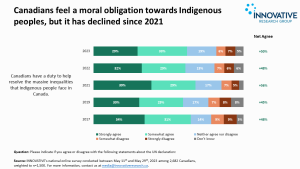
Agreement with two other statements that reflect a sense of moral obligation to Indigenous peoples remains high:
- 54% think Indigenous peoples deserve compensation for the injustices they suffered when they lost their lands
- 52% agree that government efforts on behalf of Indigenous Canadians have failed badly, so it makes sense for Indigenous people to take control of their own affairs
Special rights supporters are more likely than equal treatment supporters to have positive attitudes towards Indigenous peoples
This year, we have segmented the population based on their attitudes towards Indigenous peoples’ rights, using the following statements:
- Canada’s Indigenous peoples should have the same rights as any other Canadian, no more and no less
- Indigenous peoples should have the rights and status they need to protect their culture and heritage, even if it means they may have certain rights other Canadians do not have
39% are equal treatment supporters, 19% are special rights supporters, 33% are conflicted, and 10% are ambivalent. A detailed segmentation methodology is provided in the report.
We learn that special rights supporters are far more likely than equal treatment supporters to feel a strong sense of moral obligation towards Indigenous peoples. Net agreement to “Canadians have a duty to help resolve the massive inequalities that Indigenous people face in Canada” stand at +80% for special rights supporters and +20% for equal treatment supporters.
70% of special rights supporters also much more likely to have a positive impression of Indigenous groups and organizations, while only 24% of equal treatment supporters do.
These findings suggest that reconciliation will not happen solely based on people feeling the need for equal treatment. True reconciliation will happen when individuals recognize and acknowledge that Indigenous peoples have special rights due to their historical presence and cultural heritage.
Overall, support for Indigenous peoples in Canada remains high, but challenges persist. While public opinion on Indigenous groups and organizations has improved dramatically over the past decade, Indigenous issues are not a top priority for many Canadians. As Canada commemorates National Indigenous Peoples Day, it serves as a reminder of the ongoing work needed for reconciliation and addressing the injustices faced by Indigenous peoples. The gains in reputation place Indigenous peoples in a much stronger position to advance this work.


